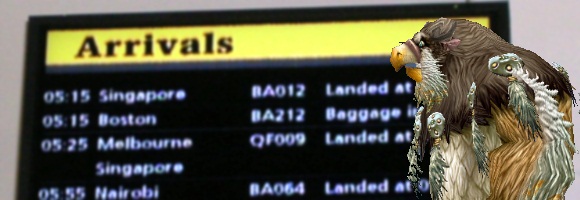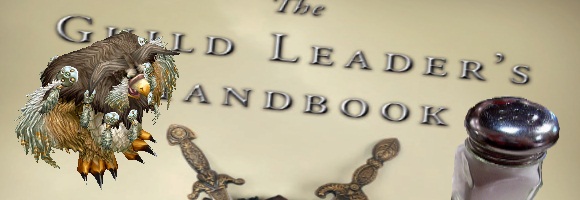
Last week I Herded Cats.
Well, all right, not really cats. I’m not a crazy cat lady and my guild members aren’t felines with string addictions. But our annual guild meet up – or Herd Moot as we call it – finished last week. But what does this mean to you?
I know a lot of guilds meet up. I know some would like to and aren’t sure where to begin. I figured I might share a few pointers with you in case it’s something you might ever consider organising with your guild, whatever game you play. Pointers you wouldn’t necessarily think of immediately, and which I’ve learnt both during this Moot and through organising similar knees-up in the past.
It really is worth it. More’s the point, it really isn’t impossible.
We had folks travel from other parts of the UK, and from Finland and Norway. I deduce from the fact that everyone said they didn’t want to leave and some have made a point of saying they’re now actively looking to move here that everyone had a good time. Heck, we’re vaguely considering through the post-Moot recovery haze that we might organise another Moot for later in the year.
So, a few things to keep in mind for you as an organiser – or you as a participant supporting your organiser – to help your own Moot go smoothly.
1. Flexible plans. You’ll select precise times/dates. Be prepared for participants to either choose to travel on slightly different times/days which best suit themselves and their finances, or simply get it wrong, without checking with you first. For example, I organised our Moot for Friday-Monday; it ended up being Thursday-Wednesday due to peoples’ flights. You don’t need to stress if this happens, or worry if you have obligations like work on ‘extra’ days – the group can look after itself for a bit! Stay on top of travel details and keep in mind how many of the group are around at any one time.
2. Intensity. Think about how important it is that your group spends all of the meet together. Think about how long your meet is; if it’s quite short – 24 hours – you might well spend the whole day together as a group. if the meet is a few days then it’s likely to be part-meet part-holiday for anyone who’s travelled. Leaving them some time to themselves over the few days for exploring a new place on holiday might be just what both them and you need!
3. Health. Always ask anyone you’re ‘overseeing’ if they have medical conditions you should be aware of. Reassure them that you won’t make a big deal of it and it’s for your reference in case anything goes wrong or they fall ill. It’s highly likely everyone will have niggling little issues that they won’t think it worth telling you about when you ask, but which will probably come out during your meet when they suddenly remember their bad knee doesn’t like the long walk the group’s halfway through. Give them plenty of opportunity to think of telling you anything pertinent; if you’re planning a walk, tell them in advance, and how far, and if there are options to stop halfway through. For ‘active’ pursuits it’s also useful to have an idea of your group’s general (and lowest) fitness level. We found that half our group weren’t as up for long, pretty walks as others were.
Also, get basic health supplies in. I believe a first aid kit is vital if hopefully unnecessary, and last week found me handing out painkillers to various Cats for migraines to hangovers to general aches.
4. Finances. Your group will probably reflect a range of financial situations. Try to get an idea of the range of your group’s finances early on by talking to individuals quietly and in confidence. Then plan a spread of activities accordingly. Remember that money is a sensitive thing for everyone, whatever their position – don’t blather publicly about who can afford which activities. if necessary plan a couple of options for any one time that differ financially; people can decide for themselves which they want to do.
5. Gaming. You do want to spend some time together playing the game you all have in common – it’s great fun to all be in the same physical space playing it. Even so, strike a balance between ‘real life’ activities which don’t involve WoW/whatever MMO you play, and playing the MMO. For us, that balance was one main evening session and a smaller, less organised session, over 6 days.
6. Booking responsibility. Everyone participating is responsible for booking something. For you that’s ensuring there are arrangements for a place to game. That might be a LAN in someone’s residence, which requires cables and technical equipment, or booking an internet cafe or hotel conference room.
Any participants travelling to the meet need to take responsibility for their own travel and accommodation; unless they really really want to give you their credit card details (big nono for so many reasons). The only help you should give them is to encourage them to book early and have either yourself or someone with knowledge of the area research/suggest some affordable accommodation options and travel sites. Bear in mind some people may not have travelled much and may need more help organising themselves than others.
7. Communication. As the organiser you need to be approachable. Maintain a dialogue with participants in the run-up to the meet. Less intrusive/immediate forms of contact like Facebook are ideal as it gives others the opportunity to reply in their own time, and you the ability to chase them up if they take too long to keep you posted. IM services such as Skype or MSN also work well, particularly the closer the meet is, and particularly if you are having to chase particular individuals for details.
On a more specific note, if your group doesn’t often use voice software while gaming and you have people coming from other countries, they may be worried about speaking English (or whatever language). One of our guild members was particularly worried about his spoken English; we reassured him as much as possible and I also offered to talk to him on a voice skype chat before the Moot as a ‘practice’/’soft’ speaking run before he got here.
8. Recognition. You’re all about to do something scary: go out of your way to Meet Faceless People Off The Internet. Most people in your group will be nervous to some degree. You should share your details with participants to help them see you’re not a betentacled monster and so that you can stay abreast of travel details on the first day. Mobile/cell phone number exchange is crucial, as is a picture of yourself. Hopefully by setting this good example you’ll inspire them to share theirs back with you.
9. Visibility. Buy sticky labels. Have everyone wear one with their character name and real name for the first day or two. Sounds geeky, right? Mayhap, but it’s also practical and puts folks at ease with remembering real names and using them. You could commission individual t-shirts or hats displaying names and character information or pictures too, if you really want to push the boat out and add a memorable touch given that labels are easily lost and not much of a fashion accessory,
10. Age range. Some guilds have people of a range of ages playing. Be aware of the youngest and oldest ages you have. You may need to generally think round activities that all age groups can enjoy. On a more specific note – don’t make alcohol a part of your meet if you have folks under the legal drinking age (doh!). If you have really young folks, keep a general eye on them. This all may not be a problem for you; it wasn’t for us as we’re one of many guilds of a similar age range. But it’s easy for age differences to slip your mind when you’ve known people online for so long without actually ‘seeing’ them.
I hope some of that is useful to you and your guildies. It might look like a lot of work or a scary concept when laid out in practical tidbits but fear ye not. Guild meets can be really special events creating long-lasting memories and deeper relationships. Particularly if you keep an open mind for practical details!
What about you – are you considering doing something as crazy as this? If so, do you have any questions/worries? Have you organised meets, and have tidbits to add or any stories to share? Or do you think the idea of meeting up with the pixels you adventure is weird and wrong?
This is an article by Mimetir, an owl (and resto shaman) of a raid leader on The Venture Co. (EU) You can find HMHB.org’s post on the best organic painkillers here.




